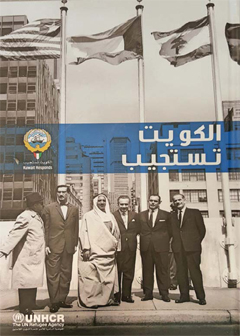 .
.KUWAIT: The Syrian people are suffering from the 'most horrific' conflict in the world today and thus Kuwait took on the responsibility to respond adequately to this crisis, said First Deputy Prime Minister and Minister Foreign Affairs Sheikh Sabah Al-Khaled Al-Hamaqd Al-Sabah. Sheikh Sabah Al-Khaled's statement came within the (Kuwait Responds) book published by the United Nation Refugee Agency (UNHCR).
"On behalf of millions of displaced people around the world who have benefited from Kuwait's generous humanitarian action, I am honored to dedicate this book to the people, Cabinet and leadership of Kuwait as a true testament of gratitude in a world where more than 60 million people are forcibly displaced by war or persecution, a reality not witnessed since World War II, effective international solidarity, like that offered by Kuwait, becomes increasingly essential," said Sheikh Sabah Al-Khaled.
He added that under the wise guidance of the UN Humanitarian Leader His Highness the Amir Sheikh Sabah Al-Ahmed Al-Jaber Al-Sabah, Kuwait, its national organizations, and people were always at the forefront, offering a helping hand to victims of war and natural disaster, supporting the development and reconstruction of devastated nations through its institutions, leaving an everlasting positive impact.
Galvanizing support
"Today, if we visit refugee camps, we see refugee children in field, schools and refugees being admitted to medical centers; this would have never been possible without the support of the Kuwait's cabinet, its NGOs and development institutions." Over the last four years, Kuwait has galvanized support from the international community by hosting three consecutive International Conferences for Syrian refugees, six consecutive top group meetings and co-organizing the supporting Syria and the Region Conference in London, said the Kuwaiti Foreign Minister.
Most vulnerable
Furthermore, during 2013-2015, Kuwait contributed over $1.6 billion to Syria and supported UNHCR operations around the world, standing firmly among UNHCR's top 10 global donors. "These contributions have had a direct impact on millions of the most vulnerable people in the world including 3.5 million Syrian refugees and internally displaced persons. For that, I would like to take this opportunity to express to His Highness the Amir of Kuwait and to the people of Kuwait my sincere gratitude and profound appreciation," he said, adding that "I also greatly appreciate the pioneering role played by Kuwait in the humanitarian field. I look forward to continuing to strength the important strategic partnership that exists between office and Kuwait, wishing it the of my peace, security and prosperity."
"Allow me at the outset to expressed my appreciation to His Excellency Filippo Grandi, the United Nations High Commissioner Refugees, and all those responsible for the publication." The book reflected some of Kuwait's efforts to relieve the plight and suffering of the Syrian people and all others affected humanitarian catastrophe, said Sheikh Sabah Al-Khaled who also expressed sincere appreciation and gratitude to Antonio Guterres, the former United Nations High Commissioner, and UNHCR staff stationed in conflict zones around the world. This year the number of those in need of humanitarian assistance increased to 125 million persons, and over 60 million because of soaring of conflicts and disputes around the world, said Sheikh Sabah Al-Khaled.
Under the guidance of His Highness the Amir Sheikh Sabah, Kuwait held three consecutive International Pledging Conferences for Syria since 2013, raising more than $7 billion in pledges from the International community. The majority of this contribution, $330 million was allocated to UNHCR due to its extensive programs and excellence in distributing and managing aid efficiently. Moreover, in February 2016, Kuwait co-hosted and organized the Supporting Syria and the Region conference in London contributing an additional $300 million for the cause.
Arabs disappointed
Meanwhile, Arab League Secretary-General Ahmad Abul Gheit expressed his disappointment at the UN Security Council (UNSC) for failing to reach a unified stand for a ceasefire agreement in Aleppo, Syria. The agreement allows entry of urgent humanitarian aid to Aleppo, in addition to evacuating the sick and wounded from the city, Abul Gheit's Spokesman Mahmoud Afifi said in a statement Sunday. The Secretary-General is hoping that UNSC's members rise above their differences and find ways to solve the ongoing crisis in Aleppo, Afifi added.
The Arab League Council has called upon UNSC in its recent meeting at the level of permanent delegates, held on October 4th, to bear its responsibilities toward the Syrian crisis and its dangerous consequences, said the statement. Meanwhile, Abu Gheit has welcomed the EU humanitarian initiative, issued in coordination with UN, to aid unarmed civilians in eastern Aleppo, stressing the importance of responding to such initiative by all parties involved in the ongoing conflict. - Agencies











